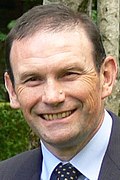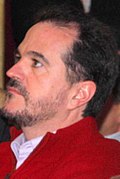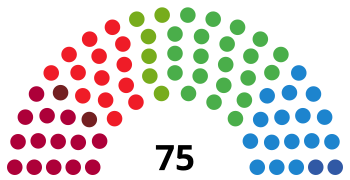| Polling firm/Commissioner | Fieldwork date | Sample size | Turnout |  |  | 
 |  |  |  |  | Lead |
|---|
| | | | | | |
|---|
|
| 1998 regional election | 25 Oct 1998 | — | 70.0 | 27.6
21 | 17.4
14 | 17.7
14 | 19.9
16 | 8.6
6 | 5.6
2 | 1.2
2 | 7.7 |
|
| Eco Consulting/EITB [p 1] [p 2] | 25 Oct 1998 | 21,000 | ? | 28.9
21/23 | 16.0
11/13 | 20.9
16/18 | 14.7
13/15 | 8.6
5/7 | 6.2
3/5 | 1.0
1/2 | 8.0 |
| Sondaxe/Tele 5 [p 1] [p 2] | 25 Oct 1998 | 2,250 | ? | ?
21 | ?
16 | ?
11 | ?
15 | ?
6 | ?
5 | ?
1 | ? |
| Sigma Dos/Antena 3 [p 1] [p 2] | 25 Oct 1998 | ? | ? | ?
21/22 | ?
12/14 | ?
12/13 | ?
15 | ?
5/7 | ?
4/5 | ?
2/3 | ? |
| Demoscopia/El País [p 3] [p 4] | 18 Oct 1998 | ? | 65–67 | 30.4
21/22 | 17.4
13/14 | 15.8
11/12 | 16.8
13/15 | 9.7
6/7 | 8.7
5/6 | 1.2
2 | 13.0 |
| Sigma Dos/El Mundo [p 5] [p 6] | 14–16 Oct 1998 | 1,000 | ? | 30.2
21/23 | 14.7
10/12 | 16.6
12/14 | 17.8
13/15 | 9.9
7 | 7.8
5 | 1.5
3 | 12.4 |
| Gallup/ABC [p 7] | 9–14 Oct 1998 | 1,506 | 76.0 | 30.8
22/23 | 18.6
14/15 | 15.3
11 | 15.4
13/14 | 9.5
7 | 8.3
5 | 0.9
1/2 | 12.2 |
| Ábaco/Tele 5 | 13 Oct 1998 | ? | ? | ?
21 | ?
15 | ?
12 | ?
16 | ?
5 | ?
5 | ?
1 | ? |
| Opina/La Vanguardia [p 8] [p 9] | 12–13 Oct 1998 | 1,500 | 70 | 29.0
20/21 | 19.0
13/15 | 15.0
11/12 | 18.0
14/15 | 9.0
8 | 7.0
6 | 1.0
2 | 10.0 |
| Bergareche/El Correo [p 4] [p 6] [p 10] | 8–12 Oct 1998 | 4,650 | ? | 27.2
20/21 | 19.5
15/16 | 14.9
11/12 | 17.1
14/15 | 8.4
5/6 | 8.4
5/6 | 1.3
2 | 7.7 |
| PP [p 11] | 9 Oct 1998 | ? | ? | ?
22/23 | ?
13/14 | ?
11/12 | ?
14/15 | ?
6 | ?
3/4 | ?
2 | ? |
| Siadeco/GPS [p 12] [p 13] | 2–9 Oct 1998 | 2,000 | 66.0 | 29.0
22 | 16.1
12 | 18.4
14 | 15.3
13 | 9.7
7 | 8.5
5 | 1.4
2 | 10.6 |
| CIS [p 14] [p 15] | 25 Sep–8 Oct 1998 | 2,097 | 64.7 | 29.3
21/22 | 18.4
14/15 | 16.1
12/13 | 16.7
13/14 | 8.7
6 | 7.7
5 | 1.4
2 | 10.9 |
| PSOE [p 11] [p 16] [p 17] | 6–7 Oct 1998 | 1,354 | ? | ?
23 | ?
15 | ?
11 | ?
14 | ?
6 | ?
4 | ?
2 | ? |
| Siadeco/GPS [p 18] [p 19] | 21–26 Sep 1998 | 2,000 | 67.0 | 29.4
22 | 15.9
12 | 17.7
13 | 15.3
12 | 9.9
7 | 8.7
6 | 1.5
3 | 11.7 |
| Siadeco/GPS [p 20] [p 21] | 7–15 Sep 1998 | 2,000 | 65.0 | 29.6
22 | 16.5
12 | 15.8
11 | 15.5
13 | 10.0
8 | 9.3
6 | 1.5
3 | 13.1 |
| Sigma Dos/El Mundo [p 22] | 28 Aug–3 Sep 1998 | 900 | ? | 30.0
21 | 16.2
13 | 15.2
11 | 16.5
14 | 9.2
6 | 9.1
6 | 2.0
4 | 13.5 |
| CPS/EHU [p 23] [p 24] | 1–15 Jun 1998 | 1,400 | 64 | 29.0
20/21 | 21.0
15/16 | 13.0
10 | 17.0
13/15 | 9.0
6/7 | 7.0
5 | 1.0
2/3 | 8.0 |
| Bergareche/El Correo [p 25] [p 26] [p 27] | 4–9 Jun 1998 | 2,625 | ? | 28.3
21 | 20.1
15/16 | 12.6
9/10 | 17.4
14/15 | 7.7
6 | 8.8
6/7 | 1.1
2 | 8.2 |
| Siadeco/GPS [p 28] [p 29] | 11–20 May 1998 | 2,846 | 62.5 | 29.5
22 | 17.0
14 | 14.9
11 | 16.0
13 | 10.0
7 | 9.1
6 | 1.4
2 | 12.5 |
| CIS [p 30] [p 31] | 6–31 Mar 1998 | 2,099 | 61.4 | 29.2
21/22 | 18.4
14/15 | 15.3
11 | 16.5
13/14 | 9.7
7/8 | 7.6
5 | 1.5
2 | 10.8 |
| Bergareche/El Correo [p 32] [p 33] [p 34] [p 35] | 6–13 Mar 1998 | 2,636 | ? | 26.6
20/22 | 20.0
16 | 12.2
9 | 18.6
16 | 7.4
5 | 9.0
5/6 | 1.4
2/3 | 6.6 |
| Siadeco/GPS [p 36] [p 37] | 30 Jan–7 Feb 1998 | 1,500 | 65.0 | 29.6
22 | 16.6
12 | 14.4
11 | 16.4
13 | 10.2
8 | 9.1
6 | 1.3
3 | 13.0 |
| Bergareche/El Correo [p 38] [p 39] [p 40] | 9 Nov 1997 | 2,682 | ? | 29.6
23 | 19.2
15 | 12.0
9 | 16.7
15 | 8.1
6 | 7.5
5 | 1.3
2 | 10.4 |
| Siadeco/GPS [p 28] [p 41] [p 42] [p 43] | 16–24 Sep 1997 | ? | 66.0 | 29.9
22 | 16.6
12 | 14.0
11 | 16.2
13 | 10.2
9 | 9.0
5 | 1.4
3 | 13.3 |
| Sigma Dos/El Mundo [p 44] | 16–17 Jul 1997 | 800 | ? | 32.5 | 15.6 | 12.9 | 17.9 | 9.7 | 8.8 | 2.2 | 14.6 |
| CPS/EHU | 8 Jun 1997 | 1,400 | ? | 29.1
20 | 18.5
15 | 12.5
10 | 14.0
12 | 9.2
7 | 9.4
7 | 2.0
4 | 10.6 |
| Siadeco/GPS [p 45] | 25 Mar 1997 | ? | 64.0 | 29.6
22 | 16.8
12 | 13.7
11 | 15.6
12 | 10.1
8 | 9.8
7 | 1.5
3 | 12.8 |
| 1996 general election | 3 Mar 1996 | — | 71.5 | 25.0
(18) | 23.7
(20) | 12.3
(9) | 18.3
(15) | 8.2
(6) | 9.2
(7) | – | 1.3 |
| 1995 foral elections | 28 May 1995 | — | 63.9 | 28.4
(22) | 16.7
(13) | 14.4
(11) | 15.5
(11) | 10.9
(9) | 8.1
(5) | 2.1
(4) | 11.7 |
| 1995 local elections | 28 May 1995 | — | 64.0 | 27.9 | 16.9 | 14.4 | 14.4 | 10.6 | 7.2 | 1.9 | 11.0 |
|
| 1994 regional election | 23 Oct 1994 | — | 59.7 | 29.3
22 | 16.8
12 | 16.0
11 | 14.2
11 | 10.1
8 | 9.0
6 | 2.7
5 | 12.5 |
|















